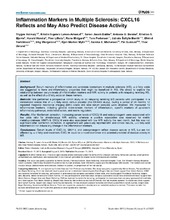Inflammation markers in multiple sclerosis: CXCL16 reflects and may also predict disease activity
Holmøy, Trygve; Løken-Amsrud, Kristin Ingeleiv; Bakke, Jacob; Beiske, Antonie Giæver; Bjerve, Kristian S; Hovdal, Harald Olav; Lilleås, Finn; Midgard, Rune; Pedersen, Tom; Saltyte Benth, Jurate; Torkildsen, Øivind; Wergeland, Stig; Myhr, Kjell-Morten; Michelsen, Annika; Aukrust, Pål; Ueland, Thor
Peer reviewed, Journal article
Published version

Åpne
Permanent lenke
https://hdl.handle.net/1956/11654Utgivelsesdato
2013-09-19Metadata
Vis full innførselSamlinger
Originalversjon
https://doi.org/10.1371/journal.pone.0075021Sammendrag
Background. Serum markers of inflammation are candidate biomarkers in multiple sclerosis (MS). ω-3 fatty acids are suggested to have anti-inflammatory properties that might be beneficial in MS. We aimed to explore the relationship between serum levels of inflammation markers and MRI activity in patients with relapsing remitting MS, as well as the effect of ω-3 fatty acids on these markers. Methods. We performed a prospective cohort study in 85 relapsing remitting MS patients who participated in a randomized clinical trial of ω-3 fatty acids versus placebo (the OFAMS study). During a period of 24 months 12 repeated magnetic resonance imaging (MRI) scans and nine serum samples were obtained. We measured 10 inflammation markers, including general down-stream markers of inflammation, specific markers of up-stream inflammatory pathways, endothelial action, and matrix regulation. Results. After Bonferroni correction, increasing serum levels of CXCL16 and osteoprotegerin were associated with low odds ratio for simultaneous MRI activity, whereas a positive association was observed for matrix metalloproteinase (MMP) 9. CXCL16 were also associated with low MRI activity the next month, but this was not significant after Bonferroni correction. In agreement with previously reported MRI and clinical results, ω-3 fatty acid treatment did not induce any change in the inflammation markers. Conclusions. Serum levels of CXCL16, MMP-9, and osteoprotegerin reflect disease activity in MS, but are not affected by ω-3 fatty acid treatment. CXCL16 could be a novel biomarker and potential predictor of disease activity in MS.
